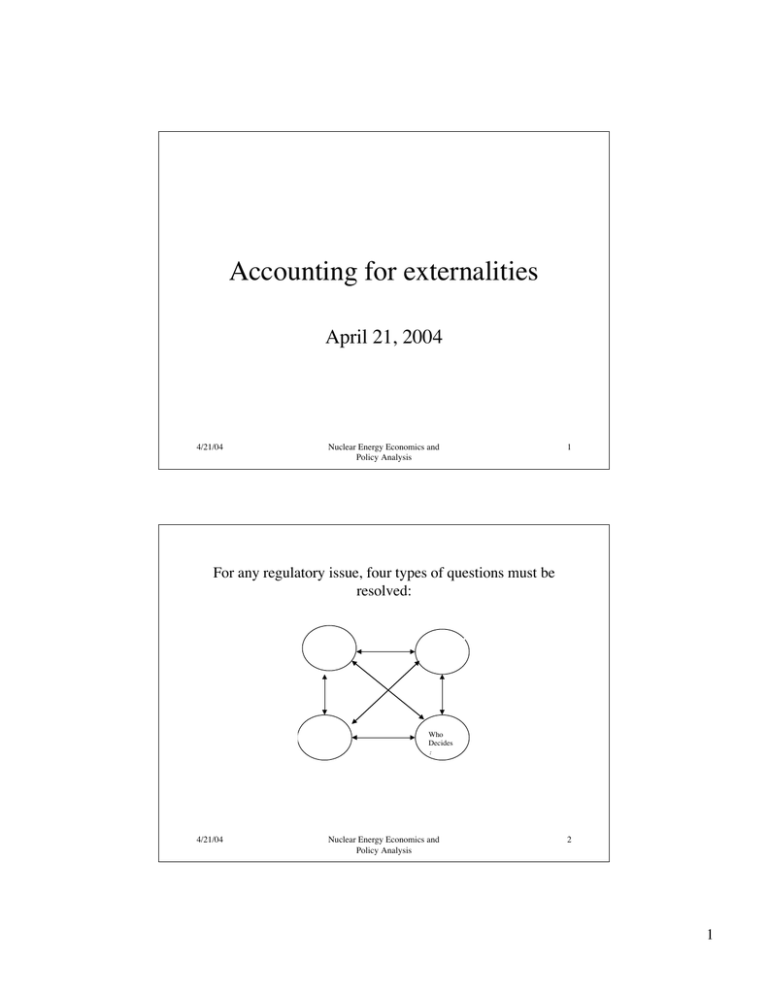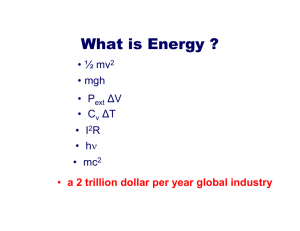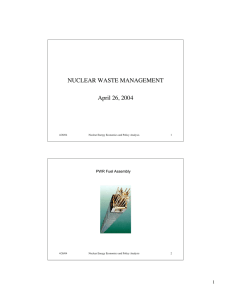Accounting for externalities April 21, 2004 resolved:
advertisement

Accounting for externalities April 21, 2004 4/21/04 Nuclear Energy Economics and Policy Analysis 1 For any regulatory issue, four types of questions must be resolved: What Who� Pays?� 4/21/04 How Who Decides ? Nuclear Energy Economics and Policy Analysis 2 1 Success Criteria for Regulatory Intervention 4/21/04 Nuclear Energy Economics and Policy Analysis 3 Success criteria for regulatory intervention • Improvement • Equity • Efficiency 4/21/04 Nuclear Energy Economics and Policy Analysis 4 2� Definition of external costs “ Fuel cycle externalities are the costs imposed on society and the environment that are not accounted for by the producers and consumers of energy, i.e. that are not included in the market price. They include damage to the natural and built environment, such as effects of air pollution on health, buildings, crops, forests and global warming; occupational disease and accidents; and reduced amenity from visual intrusion of plant or emissions of noise. Traditional economic assessment of fuel cycles has tended to ignore these effects.” -- European Commission 4/21/04 5 Nuclear Energy Economics and Policy Analysis Failure to take account of external costs will result in excessive pollution Price Supply curve Demand curve Quantity 4/21/04 Nuclear Energy Economics and Policy Analysis 6 3� • The effect of regulation is to internalize – Mandatory controls on technology – Mandatory emissions limits • But regulations do not eliminate external costs • In principle, want to minimize total social cost (= internal cost + residual external cost) • In practice, external costs haven’t been considered until recently • Now there are attempts to do so – Resource/technology selection decisions – Emissions taxes – Subsidies of renewables on the basis of avoided external costs Representative Externality Assessment Inputs Units are Dollars Per Metric Ton State Emissions SO 2 NOx VOCs CO Particulates CO 2 CH4 N 2O NY PSC 900 1960 350 2.2 - MA DPU NV PSC 1650 7170 5840 950 4400 24 240 4400 1720 7500 1300 1000 4600 24 240 4600 CA PU 4500 7800 3600 2600 29 - Source: Economic Research Associates (1992), cited in R. W. Larson et al (eds), Economics of Solar Energy Technologies, America Solar Energy Society, Dec. 1992 Source: European Commission, ExternE Project, http:// externe.jrc .es/All-EU+Summary. htm Note: The differences in part reflect differences in the size of the affected populations in the different countries. 4/21/04 Nuclear Energy Economics and Policy Analysis 9 Source: European Commission, ExternE project 4/21/04 Nuclear Energy Economics and Policy Analysis 10 5� Decimal log scale c/kWh (1988) 0.001 0.01 0.1 1 10 100 1000 2000 100 1000 2000 Biomass Onshore wind PV Nuclear fission Gas Oil Coal 0.001 0.01 0.1 1 10 Environmentally Related Damage Costs for Selected Electricity Supply Technologies (excluding global warming) Source: A. Sterling, "Regulating the Electricity Supply Industry by Valuing Environmental Effects," Futures, Dec. 1992, pp. 1024-47; as presented in D. Toke in Ref. T-1. stated external environmental cost (bars represent range over a variety of studies) 1995 c/kWh logarithmic scale 0.001 0.01 0.1 1 10 100 1000 1 10 100 1000 Onshore wind Photovoltaics Biomass Hydroelectricity Nuclear fission Gas Oil Coal 0.001 0.01 0.1 Range of Externality Study Estimates (including global warming) from Ref. S-3 Source: A. Sterling, Futures, Dec. 1992, pp. 1024-47



